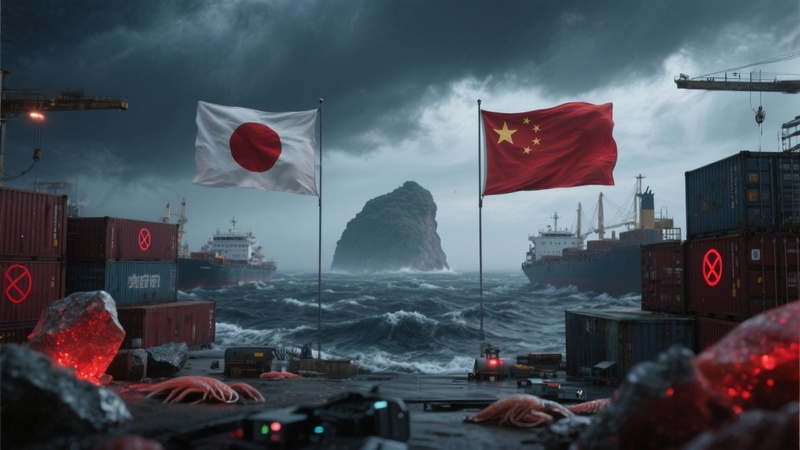Concerns are mounting in Tokyo and Beijing that a dispute over Taiwan could result in a prolonged diplomatic breakdown, with observers drawing parallels to the deterioration in relations over the Senkaku Islands more than a decade ago. The rising Japan–China tensions reflect these concerns.
Tensions intensified after senior officials from both countries met in Beijing earlier this week without making progress. The following day, China reinstated a ban on imports of Japanese seafood, reversing a partial lifting that had been interpreted as a gesture to ease friction amid ongoing Japan–China tensions.
China has previously used trade sanctions against Japan as a political tool. In 2010, Beijing halted exports of rare earth minerals after a Chinese vessel collided with Japanese coast guard ships near the Senkaku Islands. Two years later, Japan’s decision to nationalize the islands led to a boycott of Japanese products and vandalism of Japanese businesses across China. Diplomatic engagement only resumed in late 2014 when leaders from both nations met to restart dialogue amidst rising Japan–China tensions.
Current political and economic signals indicate the relationship may be at its lowest point since that period. Analysts warn that China may escalate its strategy further through a rare-earth embargo or by encouraging consumer boycotts of Japanese goods.
In Tokyo, the ruling Liberal Democratic Party is seeking to reduce tensions, calling for continued dialogue with Beijing. The appeal comes after internal criticism urging punitive action against a Chinese diplomat who publicly made inflammatory remarks directed at Prime Minister Sanae Takaichi.
The latest dispute stems from Takaichi’s comments in parliament suggesting that Japan’s right to collective self-defense could apply if China were to take military action against Taiwan. She described such circumstances as a survival-threatening situation that could lead to Japan supporting U.S. forces in a regional conflict.
China has demanded a withdrawal of the remarks, while Japan has declined, stating that its position is unchanged and that any decision on self-defense would depend on circumstances at the time. China maintains that Taiwan is part of its territory and considers the issue central to its national interests. Japan has previously stated that it understands and respects China’s position.
Since the remarks, Beijing has gradually expanded retaliatory actions beyond seafood restrictions. A travel warning was issued for Chinese citizens considering visits to Japan, followed by an advisory discouraging Chinese students from studying there. Cultural and business activities have also been affected, including the postponement of Japanese film releases in China and the cancellation of an entertainment tour by Japanese company Yoshimoto Kogyo.
Research specialists warn that Japan may face a long confrontation, noting that other nations have experienced extended disputes with China. Norway endured salmon restrictions for seven years following the award of the Nobel Peace Prize to dissident Liu Xiaobo. Canada faced a halt to canola purchases in 2019 after the arrest of Huawei executive Meng Wanzhou, and Australia faced tariffs on wine imports in 2020 after calling for an investigation into the origins of COVID-19.
China has reinforced its stance through official messaging. The Ministry of State Security issued a statement committing to intensifying measures against activities viewed as threats to national unity. State-aligned media has also expanded territorial arguments, with commentary questioning Japanese sovereignty over Okinawa.
In a further sign of deteriorating ties, China postponed a trilateral culture ministers’ meeting with Japan and South Korea scheduled for November 24. Business groups and political analysts warn that Japanese nationals could face increasing risks as Beijing steps up scrutiny under its anti-espionage campaign.






